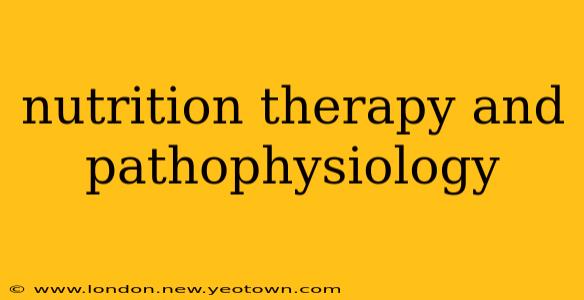Imagine your body as a finely tuned machine. It needs the right fuel – the right nutrition – to run smoothly. But what happens when something goes wrong? When disease disrupts the delicate balance of bodily functions? This is where the fascinating intersection of nutrition therapy and pathophysiology comes into play. This isn't just about eating your vegetables; it's about understanding how nutrients support health and how their absence or imbalance contributes to disease. Let's embark on a journey to explore this critical relationship.
What is Pathophysiology?
Pathophysiology is essentially the study of how disease processes affect the normal functioning of the body. It delves into the underlying mechanisms of illness, examining how cells, tissues, organs, and ultimately, the whole body respond to injury, infection, or genetic abnormalities. Understanding pathophysiology is crucial for diagnosing and treating diseases effectively. It forms the bedrock upon which effective medical interventions are built.
How Does Nutrition Play a Role in Pathophysiology?
Nutrition is the cornerstone of health. It provides the building blocks for cells, tissues, and organs, fuels metabolic processes, and supports immune function. When nutritional deficiencies or excesses occur, it throws a wrench into the carefully orchestrated processes within the body, leading to a range of pathological conditions. This connection is so profound that poor nutrition is often a significant contributing factor—or even a direct cause—to many diseases.
Nutritional Deficiencies and Disease: A Case Study
Let's consider the impact of iron deficiency. Iron is crucial for red blood cell production; without sufficient iron, the body can't produce enough healthy red blood cells, resulting in anemia. Anemia leads to fatigue, weakness, and impaired cognitive function. This illustrates how a simple nutritional deficiency can trigger a cascade of pathophysiological changes, leading to a specific disease state.
How is Nutrition Therapy Used to Treat Diseases?
Nutrition therapy, guided by a registered dietitian or other qualified healthcare professional, is a cornerstone of managing and treating many diseases. It's not a one-size-fits-all approach; the plan is tailored to address the specific needs of the individual and the underlying pathophysiological processes.
Personalized Nutrition Plans and Disease Management
For example, someone with diabetes needs a nutrition plan that manages blood sugar levels. This involves carefully controlling carbohydrate intake, selecting foods with low glycemic index, and incorporating fiber-rich foods to improve insulin sensitivity. The plan is designed to mitigate the pathophysiological effects of diabetes. Similarly, patients undergoing cancer treatment might require specialized nutrition support to combat malnutrition, side effects of chemotherapy, and maintain overall health.
What are the Common Areas Where Nutrition Therapy Intervenes?
Nutrition therapy plays a crucial role in managing a wide spectrum of conditions. Here are some key areas:
- Cardiovascular Disease: Dietary modifications focusing on reducing saturated and trans fats, increasing fiber intake, and managing sodium intake play a crucial role in lowering blood pressure and cholesterol levels.
- Diabetes: Blood glucose control is central to managing diabetes, requiring meticulous attention to carbohydrate intake, portion sizes, and blood sugar monitoring.
- Cancer: Maintaining nutritional status during and after cancer treatment is crucial for patient wellbeing.
- Gastrointestinal Disorders: Addressing specific nutrient deficiencies and managing symptoms through dietary modifications are important for improving quality of life.
- Obesity: Weight management programs, involving dietary changes, and increased physical activity can effectively address obesity.
What are Some Common Misconceptions About Nutrition and Disease?
Many misconceptions surround nutrition and disease. For instance:
One size fits all diets: There's no magic bullet. Nutritional needs vary greatly depending on age, health status, and individual characteristics.
Miracle cures: Nutritional interventions should be part of a comprehensive treatment plan, not a replacement for medical advice.
Supplements as a replacement for whole foods: Supplements can play a supporting role, but they should never replace a balanced diet rich in whole foods.
What are the Future Directions of Nutrition Therapy and Pathophysiology Research?
Ongoing research continues to uncover the intricate mechanisms by which nutrition impacts health and disease. Areas of active investigation include:
- The gut microbiome and its influence on various diseases.
- The role of specific nutrients in preventing and treating chronic illnesses.
- Personalized nutrition based on individual genetic profiles.
- The development of novel nutritional interventions to target specific disease pathways.
The relationship between nutrition therapy and pathophysiology is complex and constantly evolving. As our understanding deepens, we can expect to see more targeted and effective nutritional interventions to prevent, manage, and treat a wider range of diseases. By understanding how nutrients support and sometimes compromise our body's intricate functions, we move toward a future of improved health and wellbeing for all.

